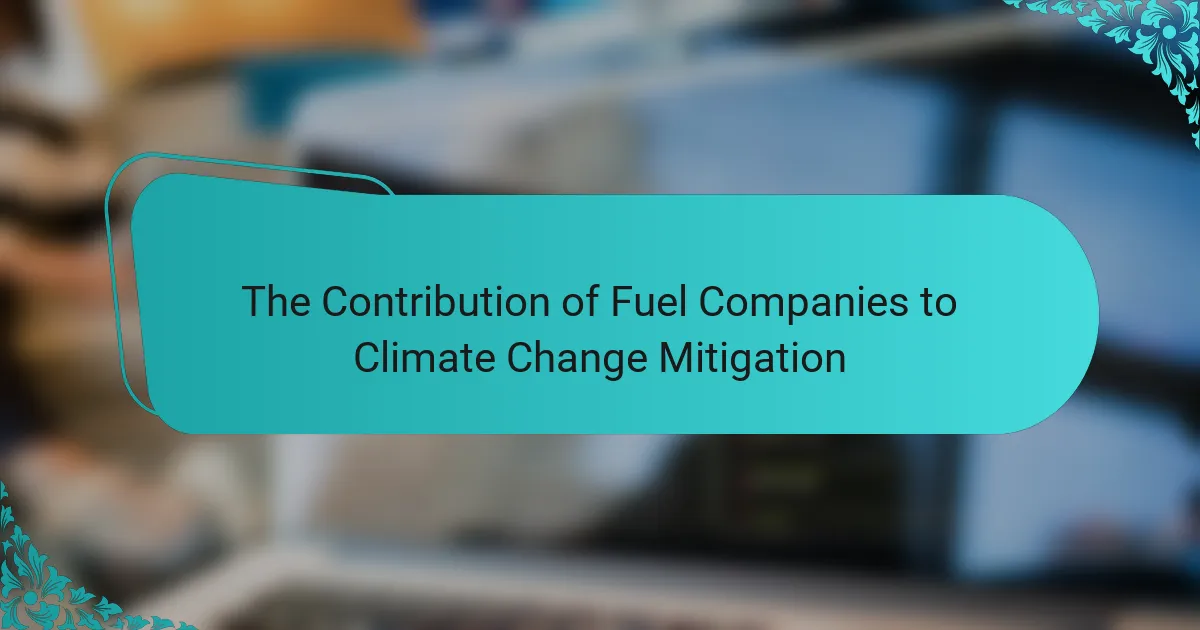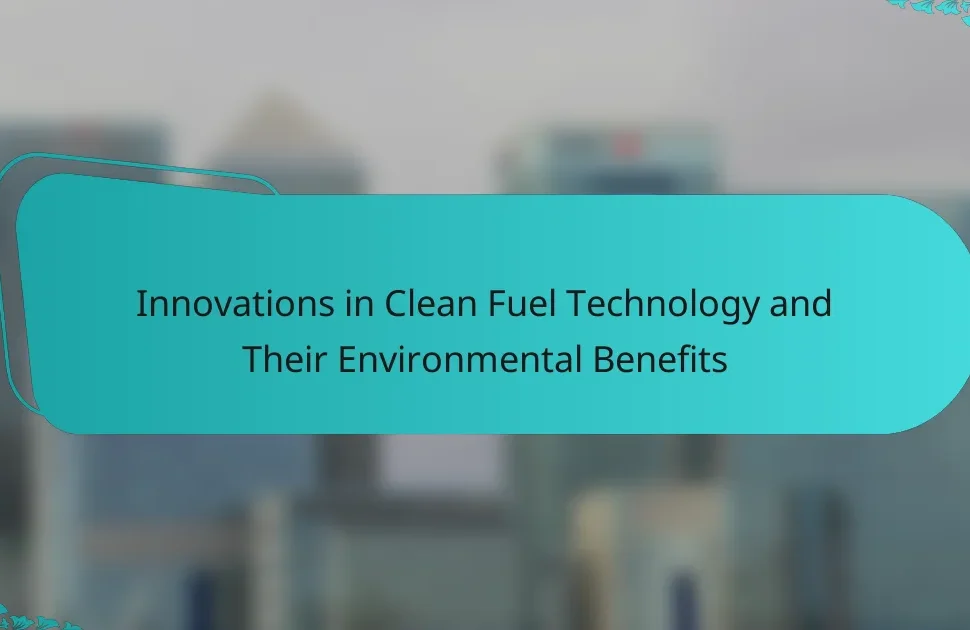
What is the role of fuel companies in climate change mitigation?
Fuel companies play a critical role in climate change mitigation by transitioning to renewable energy sources. They are investing in technologies that reduce carbon emissions. Many fuel companies are setting net-zero targets to align with global climate goals. For instance, BP aims to become a net-zero company by 2050.
Additionally, fuel companies are developing carbon capture and storage (CCS) technologies. CCS can potentially reduce greenhouse gas emissions from fossil fuel use significantly. The International Energy Agency states that CCS could account for up to 15% of the necessary emissions reductions by 2040.
Moreover, fuel companies are diversifying their energy portfolios. This includes investments in solar, wind, and bioenergy. Such diversification helps reduce reliance on fossil fuels. Therefore, fuel companies are essential in driving the energy transition needed for climate change mitigation.
How do fuel companies contribute to carbon emissions?
Fuel companies contribute to carbon emissions primarily through the extraction, refining, and burning of fossil fuels. The combustion of gasoline, diesel, and natural gas releases significant amounts of carbon dioxide (CO2) into the atmosphere. According to the U.S. Environmental Protection Agency, transportation accounts for nearly 29% of total greenhouse gas emissions in the U.S., largely due to fuel combustion. Additionally, fuel extraction processes, such as drilling and fracking, can result in methane leaks, a potent greenhouse gas. The refining process also emits CO2 and other pollutants. In 2020, global CO2 emissions from fossil fuels were approximately 33 billion metric tons, with fuel companies being key contributors. Thus, their operations significantly impact climate change by increasing atmospheric carbon levels.
What are the primary sources of emissions from fuel companies?
The primary sources of emissions from fuel companies are the extraction, refining, and combustion of fossil fuels. During extraction, methane leaks occur, contributing significantly to greenhouse gas emissions. Refining processes also release carbon dioxide and volatile organic compounds. Additionally, the combustion of fuels in transportation and power generation is a major source of carbon dioxide emissions. According to the International Energy Agency, fossil fuel combustion accounted for over 70% of global greenhouse gas emissions in 2019. This data underscores the substantial impact fuel companies have on climate change through these emissions.
How do these emissions impact global warming?
Emissions from fuel companies significantly contribute to global warming. These emissions primarily consist of greenhouse gases like carbon dioxide and methane. Greenhouse gases trap heat in the Earth’s atmosphere, leading to increased global temperatures. According to the Intergovernmental Panel on Climate Change (IPCC), human activities, including fossil fuel combustion, are responsible for over 70% of global emissions. The rise in temperatures causes severe weather events, melting ice caps, and rising sea levels. Additionally, the World Meteorological Organization (WMO) reports that global temperatures have increased by approximately 1.2 degrees Celsius since the late 19th century. This warming poses risks to ecosystems, human health, and food security. Thus, emissions from fuel companies play a critical role in accelerating climate change.
What strategies are fuel companies employing for climate change mitigation?
Fuel companies are employing various strategies for climate change mitigation. These strategies include investing in renewable energy sources, such as wind and solar power. Many companies are also focusing on carbon capture and storage technologies. This involves capturing carbon dioxide emissions from their operations and storing it underground. Additionally, fuel companies are enhancing energy efficiency in their operations. They are implementing measures to reduce emissions during production and distribution. Some companies are committing to net-zero emissions targets by specific dates. This includes setting science-based targets to align with global climate goals. Furthermore, partnerships with governments and organizations are being formed to promote sustainable practices. These actions demonstrate a commitment to reducing the carbon footprint associated with fuel production and consumption.
What are the key initiatives fuel companies are taking to reduce emissions?
Fuel companies are implementing several key initiatives to reduce emissions. These initiatives include investing in renewable energy sources. Many fuel companies are transitioning towards biofuels and hydrogen as cleaner alternatives. They are also enhancing energy efficiency in their operations. This includes adopting advanced technologies to minimize waste and emissions. Carbon capture and storage (CCS) is another significant initiative. Companies are developing CCS technologies to capture CO2 emissions from fossil fuel usage. Additionally, some fuel companies are committing to net-zero emissions targets by specific dates. For instance, several firms aim to achieve this by 2050. These initiatives demonstrate a proactive approach to mitigating climate change impacts.
How effective are these initiatives in achieving climate goals?
These initiatives are moderately effective in achieving climate goals. Fuel companies have committed to reducing greenhouse gas emissions. For instance, many have set targets to achieve net-zero emissions by 2050. The effectiveness of these initiatives varies by company and region. A report by the International Energy Agency indicates that some companies are investing heavily in renewable energy. However, others continue to expand fossil fuel production, undermining overall climate goals. The transition to sustainable practices is often slow and faces significant challenges. In summary, while there are positive steps, the overall impact remains limited without broader industry changes.

What challenges do fuel companies face in mitigating climate change?
Fuel companies face significant challenges in mitigating climate change. These challenges include regulatory pressures to reduce greenhouse gas emissions. Additionally, there is a growing demand for cleaner energy alternatives from consumers and governments. Investment in renewable energy technologies requires substantial financial resources. Fuel companies also contend with existing infrastructure that favors fossil fuel extraction and distribution. Market volatility affects their ability to transition to sustainable practices. Furthermore, public perception and environmental activism can hinder their operations. Finally, the need for collaboration with various stakeholders complicates their efforts. These factors collectively create a complex landscape for fuel companies aiming to address climate change effectively.
Why is transitioning to renewable energy difficult for fuel companies?
Transitioning to renewable energy is difficult for fuel companies due to high capital costs and existing infrastructure. Fuel companies have significant investments in fossil fuel extraction, refining, and distribution systems. This creates a financial barrier to shifting to renewable technologies. Additionally, the volatility of oil and gas markets complicates long-term planning for renewable investments. Companies face pressure from shareholders to maintain profitability, often prioritizing short-term gains over long-term sustainability. Regulatory and policy uncertainties further hinder the transition. Many fuel companies lack expertise in renewable technologies, making it challenging to develop new competencies. These combined factors create a complex landscape for fuel companies attempting to transition to renewable energy sources.
What are the economic barriers to adopting renewable energy sources?
High initial capital costs are significant economic barriers to adopting renewable energy sources. These costs include expenses for technology, infrastructure, and installation. Many renewable energy projects require substantial upfront investments. For example, solar panel installation can exceed $20,000 for residential systems. Additionally, the fluctuating costs of fossil fuels can make renewables less competitive. This price volatility can deter investment in renewable technologies. Furthermore, limited access to financing options can restrict project development. Many investors may perceive renewable energy as a high-risk investment. Lastly, existing subsidies for fossil fuels create an uneven playing field. These subsidies can hinder the competitiveness of renewable energy sources.
How do regulatory challenges impact fuel companies’ efforts?
Regulatory challenges significantly hinder fuel companies’ efforts to adapt to climate change mitigation. Compliance with stringent regulations increases operational costs and limits investment in sustainable technologies. For instance, regulatory frameworks often impose penalties for emissions exceeding set limits. This creates financial pressure that can divert resources from innovation. Additionally, regulations may restrict the exploration and extraction of fossil fuels, impacting supply chains. Fuel companies face delays in project approvals due to regulatory scrutiny, affecting timely implementation of climate initiatives. Overall, these challenges create a complex landscape that complicates strategic planning for fuel companies.
What are the social implications of fuel companies’ climate strategies?
Fuel companies’ climate strategies have significant social implications. These strategies can influence public perception and trust in the energy sector. When companies invest in renewable energy, they may enhance their reputation among environmentally conscious consumers. However, if these strategies are perceived as greenwashing, public backlash can occur.
Job creation in renewable energy sectors is another social implication. Transitioning from fossil fuels to clean energy can lead to new job opportunities. Conversely, this transition may also result in job losses in traditional energy sectors.
Additionally, fuel companies’ climate strategies can impact energy prices. Investments in sustainable practices may lead to higher costs initially, affecting consumers. There is also a potential for improved community health outcomes through reduced emissions.
Overall, the social implications are complex and multifaceted, affecting various stakeholders in different ways.
How do fuel companies address public concerns about climate change?
Fuel companies address public concerns about climate change by investing in renewable energy and carbon capture technologies. Many companies have set net-zero emissions targets for the coming decades. For instance, BP aims to reduce its oil and gas output by 40% by 2030. Shell has committed to a 20% reduction in its emissions by 2030. These companies also engage in public outreach to inform stakeholders about their sustainability efforts. Additionally, they participate in climate initiatives and collaborate with governments to promote cleaner energy policies. This approach aims to build public trust and demonstrate accountability in addressing climate change.
What role do stakeholders play in shaping fuel companies’ climate policies?
Stakeholders significantly influence fuel companies’ climate policies. They include investors, customers, regulators, and advocacy groups. Investor pressure can drive companies to adopt more sustainable practices. Customers increasingly demand environmentally friendly products, prompting changes in corporate strategies. Regulatory frameworks set by governments compel compliance with climate standards. Advocacy groups raise awareness and hold companies accountable for their environmental impact. For instance, the 2021 Climate Action 100+ initiative mobilized investors to push for emissions reductions. This collective stakeholder engagement leads to more robust climate policies within fuel companies.

How can fuel companies improve their contribution to climate change mitigation?
Fuel companies can improve their contribution to climate change mitigation by investing in renewable energy sources. Transitioning from fossil fuels to solar, wind, and bioenergy reduces greenhouse gas emissions. Companies can also enhance energy efficiency in their operations. Implementing carbon capture and storage technology further minimizes their carbon footprint.
According to the International Energy Agency, transitioning to renewables could cut emissions by up to 70% by 2050. Additionally, adopting sustainable practices, such as reducing flaring and methane emissions, is crucial. Collaborating with governments on climate policies can also strengthen their impact.
These actions collectively position fuel companies as proactive participants in climate change mitigation efforts.
What best practices can fuel companies adopt for better climate action?
Fuel companies can adopt several best practices for better climate action. Implementing renewable energy sources is essential. Transitioning to solar, wind, or biofuels can significantly reduce carbon emissions. Enhancing energy efficiency in operations also plays a crucial role. This includes upgrading equipment and optimizing processes to minimize energy consumption.
Investing in carbon capture and storage technologies can further mitigate environmental impact. These technologies capture CO2 emissions from sources like power plants and store them underground. Engaging in sustainable supply chain practices is another vital strategy. Fuel companies should work with suppliers to ensure environmentally friendly sourcing of materials.
Transparency in reporting emissions and sustainability efforts fosters accountability. Regularly disclosing progress can build trust with stakeholders and customers. Collaborating with governments and NGOs on climate initiatives can amplify impact. Partnerships can lead to innovative solutions and shared resources.
Finally, setting science-based targets aligns company goals with climate science. These targets guide companies in reducing greenhouse gas emissions effectively.
How can collaboration with other industries enhance climate strategies?
Collaboration with other industries can significantly enhance climate strategies by pooling resources and expertise. Joint efforts can lead to innovative solutions that address climate challenges more effectively. For instance, partnerships between fuel companies and technology firms can accelerate the development of cleaner energy technologies. A study by the International Energy Agency highlights that cross-sector collaboration can reduce emissions by up to 70% by 2050. Additionally, sharing best practices across industries fosters a culture of sustainability. This collaboration can also improve supply chain efficiencies, reducing overall environmental impact. By working together, industries can leverage each other’s strengths, resulting in more comprehensive climate action plans.
What technological innovations can fuel companies leverage for sustainability?
Fuel companies can leverage several technological innovations for sustainability. Renewable energy sources, such as solar and wind power, provide cleaner alternatives to fossil fuels. Energy storage technologies, like advanced batteries, enhance the reliability of renewable energy. Carbon capture and storage (CCS) technologies allow companies to reduce greenhouse gas emissions from their operations. Digital technologies, including IoT and big data analytics, optimize energy efficiency and resource management. Biofuels derived from waste materials offer a sustainable alternative to traditional fuels. Hydrogen fuel cells present a zero-emission option for transportation and power generation. According to the International Energy Agency, implementing these innovations can significantly lower carbon footprints and promote sustainable practices in the fuel industry.
What resources are available for fuel companies to enhance climate initiatives?
Fuel companies can access various resources to enhance climate initiatives. These resources include government grants and incentives aimed at promoting renewable energy projects. Additionally, partnerships with environmental organizations can provide expertise and funding for sustainable practices. Research and development tax credits encourage innovation in cleaner technologies. Furthermore, industry-specific frameworks, such as the Carbon Disclosure Project, offer guidelines for measuring and reporting emissions. Collaboration with academic institutions can facilitate cutting-edge research on alternative fuels. Investment in carbon capture and storage technology is also a key resource for reducing overall emissions. These resources collectively support fuel companies in their efforts to mitigate climate change impacts.
Which organizations provide support for climate change mitigation efforts?
Organizations that provide support for climate change mitigation efforts include the United Nations Framework Convention on Climate Change (UNFCCC) and the World Resources Institute (WRI). The UNFCCC facilitates international cooperation on climate issues. It hosts annual conferences to discuss and implement climate agreements. The WRI focuses on policy research and advocacy for sustainable practices. It provides data-driven solutions to reduce greenhouse gas emissions. Other notable organizations include the Intergovernmental Panel on Climate Change (IPCC) and the Carbon Trust. The IPCC assesses scientific information related to climate change. The Carbon Trust supports businesses in reducing carbon emissions. These organizations play crucial roles in promoting climate action globally.
How can fuel companies access funding for sustainable projects?
Fuel companies can access funding for sustainable projects through various channels. They can apply for government grants specifically aimed at renewable energy initiatives. Many governments offer financial incentives to promote sustainability in the energy sector. Additionally, fuel companies can seek investments from private equity firms focused on green technologies. These firms are increasingly looking to fund projects that align with climate goals.
Another option is to partner with non-governmental organizations (NGOs) that specialize in environmental sustainability. These partnerships can provide access to resources and funding opportunities. Fuel companies can also participate in sustainability-focused crowdfunding platforms. These platforms allow them to raise capital directly from environmentally conscious investors.
Moreover, fuel companies may issue green bonds. Green bonds are specifically earmarked for financing projects that have positive environmental impacts. This method has gained popularity as investors seek to support eco-friendly initiatives. Lastly, fuel companies should engage in collaborations with research institutions. These collaborations can lead to joint funding opportunities for innovative sustainable technologies.
In summary, fuel companies can access funding through government grants, private equity investments, NGO partnerships, crowdfunding, green bonds, and research collaborations.
The main entity of this article is fuel companies and their role in climate change mitigation. The article examines how these companies contribute to carbon emissions through fossil fuel extraction, refining, and combustion, while also highlighting their efforts to transition to renewable energy sources and implement carbon capture technologies. Key strategies discussed include setting net-zero targets, enhancing energy efficiency, and diversifying energy portfolios. Additionally, the article addresses the challenges fuel companies face in adopting sustainable practices, the social implications of their climate strategies, and the resources available for enhancing their climate initiatives.




